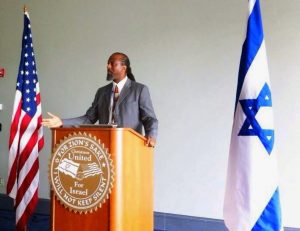This piece was originally published in The Student Life at Pomona College. It is reproduced in full below.
Connecting Zionism and Civil Rights
By Elliott Hamilton
As we commemorate Rosa Park’s triumphant refusal to go to the back of a segregated bus on Dec. 1, 1955, an action that catalyzed the Civil Rights Movement, we recall all of the wonderful things that the movement brought to the United States. It brought the end of Jim Crow laws, the passing of the Civil Rights Act, Dr. King’s “I Have a Dream” speech and many other crowning achievements of a liberal society finally changing with the times. Though great things have been accomplished, everyone can agree that much more needs to be done to ensure that Dr. King, Rosa Parks, A. Philip Randolph, Bayard Rustin and many other great Civil Rights leaders did not strive in vain.
But there is a very interesting fact about these individuals that most people do not know: All of these freedom fighters were also Zionists.
 On Nov. 19, Claremont Students for Israel and the Committee for Accuracy in Middle East Reporting in America hosted Pastor Dumisani Washington, the Director of the Institute for Black Solidarity with Israel. He came to Pitzer with the hope of educating students about the connection between the Civil Rights Movement and the Zionist movement.
On Nov. 19, Claremont Students for Israel and the Committee for Accuracy in Middle East Reporting in America hosted Pastor Dumisani Washington, the Director of the Institute for Black Solidarity with Israel. He came to Pitzer with the hope of educating students about the connection between the Civil Rights Movement and the Zionist movement.
Many of the leaders of the Civil Rights Movement were prominent, staunch Zionists who believed in the self-determination of the Jewish people. In addition, they supported the State of Israel and fought for its obligation to defend itself and its unalienable right to exist.
However, that did not suggest that Dr. Martin Luther King, Jr., ignored the plight of the Palestinian-Arab populations. Ten days before his assassination, Dr. King addressed the 68th Convention for the Rabbinical Assembly of Conservative Judaism and was asked a question about the Arab-Israeli conflict. He argued that the Israelis needed peace through security, while also saying that Israel was a great outpost of democracy. And he argued that Palestinian-Arabs needed economic security to uplift their society out of the “third world of hunger, of disease, of illiteracy.” He suggested that a Marshall Plan be used to help spark economic development of the region to give it the economic security necessary to build bridges for peace.

After Pastor Washington defended Dr. King’s hopes and aspirations for both people, he discussed the campaign to label Zionism as racism in the United Nations in 1975. Although the United Nations passed that despicable resolution, which was overturned in 1991, an organization called BASIC, Black Americans to Support Israel Committee, opposed the “anti-Jewish blacklist” while simultaneously supporting “true Palestinian self-determination.” A letter condemning the U.N. resolution was signed by the likes of Rosa Parks, Hank Aaron, Dr. Martin Luther King, Sr., Mrs. Louis Armstrong and many other prominent figures of the African-American community.
Yet Pastor Washington indicated that several key players involved in the Civil Rights Movement opposed Zionism. The Black Panthers and the Nation of Islam made their dismal view of Zionism known. According to Dr. King, such members of the community were “color consumed” and condemned anything that could be seen as “white.” The inappropriate labeling of all Jews as “white” justified such ideals, and Dr. King fervently rejected that belief.
What’s the point of telling the story about the Civil Rights Movement and its connection to Zionism? Claremont has not had a proper conversation about what Zionism truly represents. The latest war between Hamas and Israel consisted of an information front, where the vehemently anti-Zionist crowd demonized Israel and the pro-Israel community as genocidal racists who wanted to see innocent Palestinian-Arabs die. Nothing could be farther from the truth, and yet it remains a problematic belief that Claremont students continue to espouse.
Zionism is the Jewish people’s civil rights movement. It was a movement founded to protect the Jewish community from anti-Semitism throughout the world, seeing the creation of a national homeland for the Jewish people in their indigenous home of Judea as a means of bringing Jews out of persecution. The Civil Rights Movement proclaimed African-Americans’ right to life, liberty and the pursuit of happiness; as Jews, we proclaimed that we had a right to no longer be targeted by anti-Semitism in Europe or around the world, and that we have a right to live as self-determined, proud and open Jews in our indigenous homeland.
Zionism represents freedom, and it extends to more than just the Jewish people: to all of the people living in Israel. What Dr. King saw in Israel was a place where people of all different pigmentations, ethnic identities and religious affiliations could come together under one flag, under one national identity, and live in a world of tolerance, openness and freedom. It was a dream that he possessed for America, too.
Today, Israel remains the great outpost of democracy that Dr. King and the rest of the Civil Rights leadership recognized it as almost 50 years ago. Despite differences between both movements, including in history, specific goals and tactics, both movements fought for freedom and for an end to bigotry and racism. The more we recognize the strong connection between Zionism and the Civil Rights Movement, the more we will create a better dialogue to ensure tolerance, openness, acceptance and peace in our chaotic world.
Elliott Hamilton PZ ’15 is majoring in economics and minoring in politics. He is a Committee for Accuracy in Middle East Reporting in America (CAMERA) Fellow and the President of Claremont Students for Israel.

